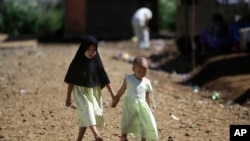A Philippine city hollowed out by civil war is under a COVID-19 lockdown through the end of this month, a move that has inadvertently added security in a region where new rebel violence can flare up anytime, observers say.
Philippine President Rodrigo Duterte placed Marawi City and surrounding Lanao del Sur province, of which it is the capital, under “modified enhanced community quarantine” Sept. 28 through the end of October, according to the presidential office website.
The province reported a jump in coronavirus cases in mid-September, from a near-zero trickle to 441, including the governor, domestic media reported. Just one local hospital is equipped to handle a raft of cases.
The Armed Forces of the Philippines and Philippine National Police are expected to pair quarantine enforcement with surveillance for any rebel movement, the Philippine Center for Investigative Journalism predicts. Road checkpoints surrounding Marawi remain in place despite the end of martial law in December, and a congressman says both enforcement agencies will add personnel this year.
Military and police must maintain their forces to keep the peace they established since martial law took hold in mid-2017, Rep. Manuel Jose Dalipe II told Philippine media.
“It just gives [authorities] more of a reason to be more vigilant,” said Herman Kraft, political science professor at University of the Philippines Diliman, referring to quarantine enforcement.
“The military presence and the militarization in the area is now even more legitimized, if you will, by justifying in terms of COVID-19,” he said.
Lanao del Sur is on the island of Mindanao, a hotspot for clashes between soldiers and about 20 Muslim rebel groups that want more autonomy in the majority-Christian country. An estimated 120,000 people have died in fighting in and around Mindanao since the 1960s.
A four-year-old state of emergency over all of Mindanao allows military and police to set up curfews and checkpoints as needed.
“Of course, it’s Marawi and it’s Mindanao, so we know that the situation can change from one moment to another,” said Enrico Cau, Southeast Asia specialist with the Taiwan Strategy Research Association.
Containment orders effective this month bar people from entering or leaving the quarantine zone, a barrier to trade and work-related travel. Public transport has receded as well in much of the Philippines as part of the widespread stay-home orders. Drivers who ferry goods and people will probably be sent away as part of quarantines around Marawi, the journalism center’s website says.
“There are some challenges if you go outside your city, but if you are within your city, your work’s there, you can go on with your life,” said Jonathan Ravelas, chief market strategist with Banco de Oro UniBank in Metro Manila.
In another area that police have merged quarantine enforcement with other priorities, drug-related killings by Philippine police had increased earlier this year, Human Rights Watch said last month.
Citizens of Marawi interviewed in 2018 said they supported the checkpoints and curfews in effect then to ward off any new violence.
Security threats are low today in Marawi but that can change in a flash, Cau said.
The province is part of a 4.3 million-person autonomous Muslim region formed by the central government in 2018 to help quell fighting, but new rebel groups sometimes emerge from the splinters of defeated ones. An armed communist insurgency remains active in Mindanao with recruitment ongoing, Cau said.
“There is always a risk that some group, it can be a rogue group, it can by anybody, takes advantage of the fact the troops and the army [are] mostly engaged and busy with these measures for the COVID,” he said. “They can actually strike where weak points are placed. That’s of course a possibility.”
As a case in point, a pair of bombings in nearby Sulu province killed at least 14 people in August, domestic media reported.
Marawi, one-time Muslim commercial hub of about 200,000, never rebuilt after civil war in 2017 killed about 1,100 people and rendered the core lakeside commercial hub a ghost town of rubble. More than half the population fled.




